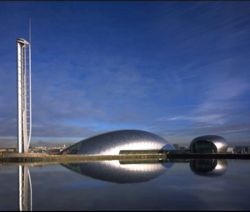Glasgow Science Centre advances the art of control

Exploiting the control capabilities of the Honeywell building management system has enabled Glasgow Science Centre to reduce energy bills by £50 000 a year.
An estimated £56 000 has been cut off the energy bill of Glasgow Science Centre following a review of the operational profile and reprogramming the Honeywell building-management system to take account of the changes. The centre opened in 2001 and comprises a science mall with three floors of exhibition space, café, shop, laboratory and planetarium. There is also an IMAX Cinema and the 105 m-high Glasgow Tower — the only building in the world that can rotate 360° from the ground up. The Honeywell BMS, compete with an Excel Building Supervisor (XBS) monitors and controls HVAC services, lighting and fire detection. For about 70 days a year, the centre is open outside normal hours to accommodate special events. The diverse and complex nature of events means that programming the BMS to accommodate them is not a trivial task, but it is simplified using the XBS. Facilities manager Alan Cuggy explains, ‘Excel Building Supervisor enables end users to assess their control needs and make improvements to their control strategy. We’ve been able to realise a big saving in energy consumption by using the controls properly.’ Before the review work could start, Alan Cuggy insisted that his team should be trained to use XBS effectively. ‘We were not using the system to its full potential and, without the update, we wouldn’t have had the confidence to make any changes.’ The first stage was to create programs for all eventualities, which involved considering different scenarios for each part of the centre and programming the BMS to provide appropriate lighting and heating. An appropriate pre-programmed control strategy can be used for events instead of having to adjust dozens of individual controllers. The facilities team then turned its attention to the individual building-management sub-systems. The lighting system has been reprogrammed to deliver bespoke control for different parts of the complex. Lighting patterns for different events have also been set up, including turning on lights in the IMAX Cinema for evening film screenings while they are off in the rest of the complex. To benefit from the daylight that is available through large windows and glass walls in exhibition areas and restaurant, a pair of daylight sensors on the north and south elevations link to the BMS, which switches off lights in these areas when the average light reading reaches a predetermined level. It was a week before staff realised that lights were being turned off on sunny days. Heating and ventilation are also delivered more efficiently. The computer suite and projector room of the IMAX Cinema now use local secondary cooling at night rather than the main chillers. Data from the BMS has been used to modify the boiler-control software to make sequencing changes. Sometimes, only one boiler runs, rather than all three. These changes are estimated to save 900 000 kWh a year. Simple modifications to control software enable more cool air from outside to be drawn in into the building, adding to energy savings. The BMS is now linked to the half-hourly meter reading so the total load can be controlled to as not to exceed the agreed maximum demand. The estimated breakdown of the savings achieved is: • boilers controls and local chilling, £30 000; • greater use of outside air for cooling, £20 000; • enhanced lighting controls and scenario setting, £5000; • external light sensors for lighting control, £1400.
Related links:


